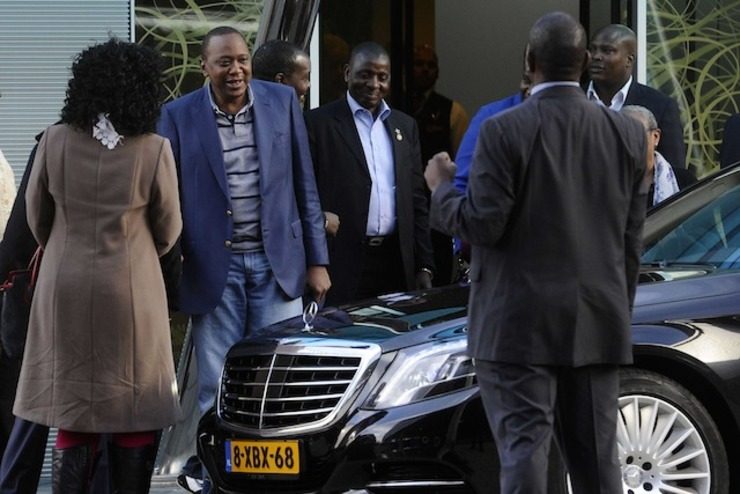SUMMARY
This is AI generated summarization, which may have errors. For context, always refer to the full article.

THE HAGUE, Netherlands – Kenya’s Uhuru Kenyatta is due on Wednesday, October 8, to become the first sitting president to appear before the International Criminal Court, summoned over his floundering trial on charges of crimes against humanity.
The powerful east African leader is to be heard by the Hague-based tribunal after judges said the case against him for allegedly masterminding post-election violence in 2007-2008 was at a “critical juncture”.
Wednesday’s “status conference” hearing was called following the prosecution’s claims that the Kenyan government was withholding evidence against Kenyatta – claims rejected by the defense.
Kenyatta arrived in The Hague on Tuesday, October 7, having temporarily handed power to his deputy and erstwhile political opponent William Ruto.
Ruto is already on trial at the ICC for his part in the violence, while Kenyatta’s trial has yet to begin despite a drawn-out 3-and-a-half year legal saga.
Kenyatta, 52, faces five counts at the ICC over his alleged role in orchestrating unrest in 2007 and 2008 that left 1,200 people dead and 600,000 displaced.
The Kenyan leader has appeared at the ICC before, but not since he was elected president in March 2013.
Not enough evidence
Kenyatta’s trial was originally scheduled to start Tuesday, but that was put off after prosecutors admitted they did not have enough evidence to proceed.
ICC chief prosecutor Fatou Bensouda last month asked for an indefinite postponement, saying Nairobi had refused to cooperate with a request for financial and other statements.
The prosecution hopes the documents will shed light on Kenyatta’s alleged involvement in the violence that brought one of east Africa’s most stable countries to the brink of civil war.
Prosecutors asked the ICC’s judges to rule against Nairobi for not cooperating in their probe, saying their case had reached a “deadlock.”
They want Kenyatta’s bank statements, tax records and telephone records during the violence. They believe that the documents could prove Kenyatta’s part in bankrolling and orchestrating the violence.
Kenya’s attorney general Githu Muigai vigorously denied the accusation, saying his efforts to assist had been hindered by his country’s bureaucracy.
‘Terminate proceedings’
Kenyatta told Kenyan lawmakers in Nairobi on Monday, October 6, he was not attending the hearing as president, but as an individual.
“Nothing in my position or my deeds as president warrants my being in court,” said Kenyatta, whose lawyers have repeatedly asked judges to drop the charges.
Kenyatta landed at Amsterdam’s Schiphol airport on a commercial flight on Tuesday afternoon, dressed casually in blue jeans.
He was whisked away in a black Mercedes with tinted windows shortly after his arrival and did not speak to the media.
Bitter memories are still fresh from 2007, when elections escalated into ethnic conflict, for which Kenyatta and Ruto were charged with crimes against humanity. Both reject the charges.
The African Union had previously called for the ICC cases to be withdrawn and transferred to Kenyan courts, accusing the ICC of targeting Africans.
Kenya’s post-electoral unrest shattered the east African country’s image as a beacon of regional stability in late 2007, when opposition chief Raila Odinga accused then president Mwai Kibaki of rigging his way back to power.
What began as political riots quickly turned into ethnic killings of Kenyatta’s Kikuyu tribe, who in return launched reprisal attacks, plunging Kenya into its worst wave of unrest since independence in 1963.
Kenyatta and Ruto, rivals in 2007, ran together in 2013 elections for the presidency, beating Odinga by a narrow margin in largely peaceful polls. – Rappler.com
Add a comment
How does this make you feel?
There are no comments yet. Add your comment to start the conversation.